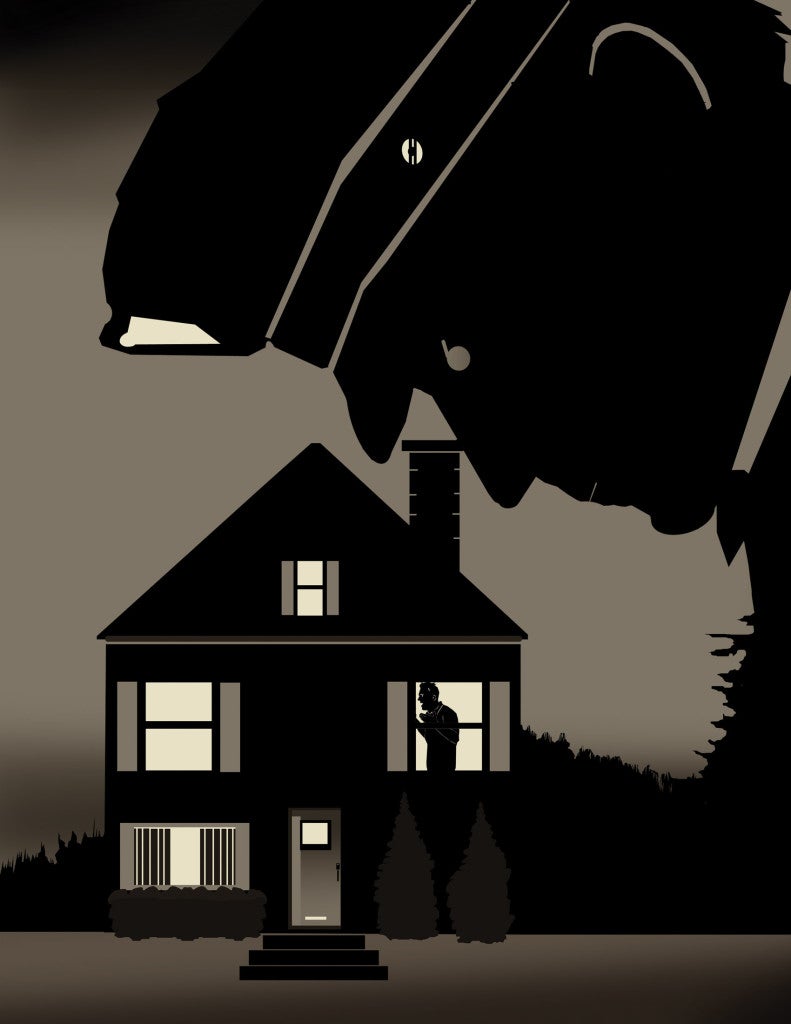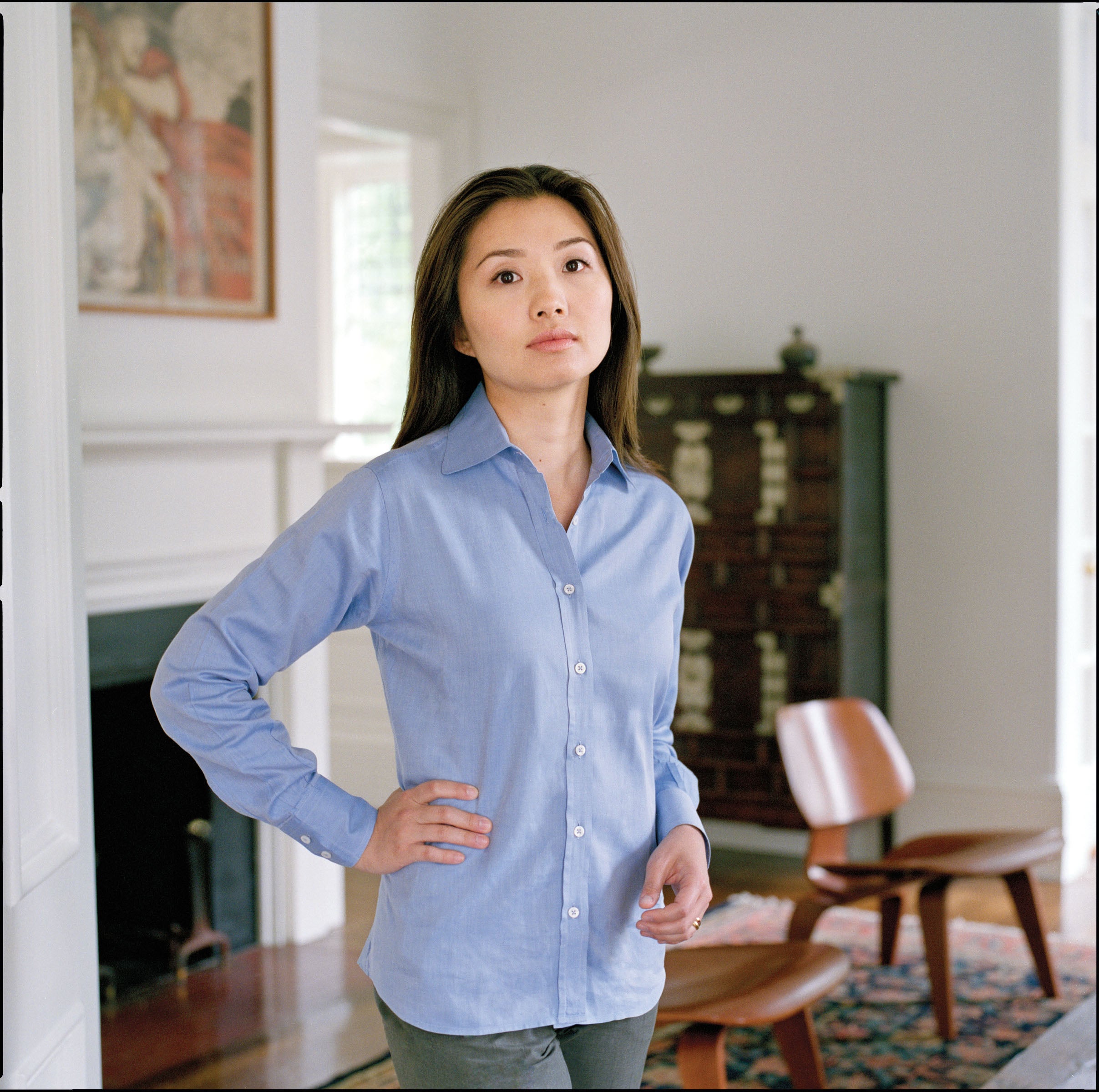To prevent domestic violence, do we now overregulate the home?
About a year and a half ago, Jeannie Suk ’02 and Larry Tribe ’66 were casually chatting at an HLS party when he asked her about a book on which she was working. As Suk, an assistant professor at HLS, responded to Professor Tribe’s questions about her research, she suddenly formulated her core thesis.
“It was in the middle of talking to him, in that moment, that I said, ‘This is my argument!’” recalls Suk, a 2009 Guggenheim Fellow and a senior fellow of the Humanities Center at Harvard, whose areas of concentration include family law and criminal law. “Larry looked at me and said, ‘Are you saying …’ and then repeated back what he thought I was saying, and said, ‘Because if you’re saying that, that’s huge—that’s amazing.’ And I said, ‘That is what I’m saying.’”
The revelation prompted by their dialogue was that there has been a revolution over the past 40 years in the legal concept of home. Instead of the centuries-old notion of home as a place of sanctuary and safety, the law has made “a radical shift,” Suk says, and now regards home as a place of actual and potential violence that requires hyper-vigilance and far-reaching action by the state, including the restructuring of family relationships. She argues that the state now regulates the home in a way that has enormous implications for basic concepts of privacy in myriad areas of law and policy—not just the enforcement of domestic violence laws.

Today, Suk’s elaboration on her thesis has been published as “At Home in the Law: How the Domestic Violence Revolution Is Transforming Privacy” (Yale University Press, 2009). In the book, Suk suggests that the legal system’s laudable goal of protecting people—primarily women—from domestic violence has had significant, unintended consequences that impinge on privacy in the home and are harming families, especially in lower-income communities where police presence is more pervasive and intrusive.
Like Tribe, other colleagues at Harvard are praising Suk’s work as courageous and groundbreaking. “It’s a big thesis, and it’s a powerful one,” says Joseph Koerner, the Victor S. Thomas Professor of the History of Art and Architecture at Harvard University, whose work includes a focus on the meaning of home. “The changes that have occurred in [recent decades] around how the law infiltrates and is seen as part of the family home as opposed to what affects the family home—that’s a very profound difference.”
In one chapter, Suk observes that accusations of domestic violence, unlike most other crimes, can set into motion a train of events that almost no one has the power to halt, including the alleged victim. If a neighbor calls police after hearing what sounds like fighting in the apartment next door, the specter of domestic violence will lead police to suspect a crime and interpret things they witness as support for that suspicion. A broken plate on the floor, for example, can be the basis for probable cause that domestic violence has occurred, even if both spouses insist it did not or the woman downplays the seriousness of the event. The husband may be arrested and charged with domestic violence (which now includes much conduct that is not physical); a restraining order will be issued ordering him to stay away from the home; and if he tries to visit his family, he will be arrested again and thrown into jail. In many jurisdictions, the prosecutor will be compelled to pursue a domestic violence case even against the wife’s objections, and the case can proceed based solely on the police observations. The result can be a family permanently divided—what Suk calls “de facto divorce.”
“I think Jeannie is showing that in many cases, we are way, way overcorrecting,” says Janet Halley, HLS Royall Professor of Law and an expert on family law and legal theory. “One thing she found as a prosecutor [Suk worked briefly as a prosecutor in New York] is that once the phone call goes in and police establish there’s been any violence—or sometimes even the threat of violence, or psychological violence—then a whole machine that was set up to deal with women whose bones were broken or who were repeatedly raped goes into action, and that there’s no break in that machine, in some of these regimes we’ve got.”
Suk insists she is not diminishing the seriousness of domestic violence but is seeking an honest discussion on whether we should be satisfied with the legal reforms we have had, given their significant consequences for privacy and autonomy. “Throwing the remote control or throwing a chair on the ground is not the same as taking a bat and beating somebody,” Suk says, “but a philosophy about the subordination of women observes that subordination happens paradigmatically in the home between a husband and wife. Everything that happens in the home is subject to that lens, and the law makes fewer distinctions in human interactions and regulates so much more than might be ideal for protecting autonomy in the home, where women and men still lead much of their intimate lives. Everyone knows that intimate lives include some things that aren’t pretty, and perhaps we need to consider more sensitive distinctions between the unpleasant and the criminal there.”
Forty years ago, police routinely failed to take domestic violence seriously, and tragedies frequently resulted, Suk notes. But in today’s legal environment, she explains, throwing a plate on the floor, or even calling a spouse an ugly name, is not viewed as a minor incident but as a possibly inextricable part of a very serious whole. “All of these things can be interpreted as preludes to and smaller instantiations of something so pernicious and nefarious that it has to be rooted out by the state,” she says.
What is needed, Suk believes, is honest reflection on whether it’s time to restore a better balance between privacy and safety. For one thing, she says, “I’d take another look at the way, in many jurisdictions, all kinds of crimes committed against spouses are considered domestic violence—even stealing from your spouse or emotional harassment.” But her primary criticism is of mandatory prosecution of an alleged abuser even in misdemeanor cases in which a victim wants the charges dropped. “I would emphasize what it is that the victim says she wants,” she says. “Because if there aren’t even any bruises and law enforcement is in the habit of enforcing what it thinks she should want, it’s getting into really messy territory of state control of the home, not to mention women’s autonomy.”
While Suk tends to take on very difficult topics in her work—her next article is on abortion—her goal is not conflict but honest discourse. “I wish there were a way that the domestic violence community would not think what I’m out to do is destroy their work and destroy all their progress,” she says. “I wish that were possible, and my optimistic hope is that the book will be received as an opening to conversation and genuine reflection, not a polemic against a good cause.”
